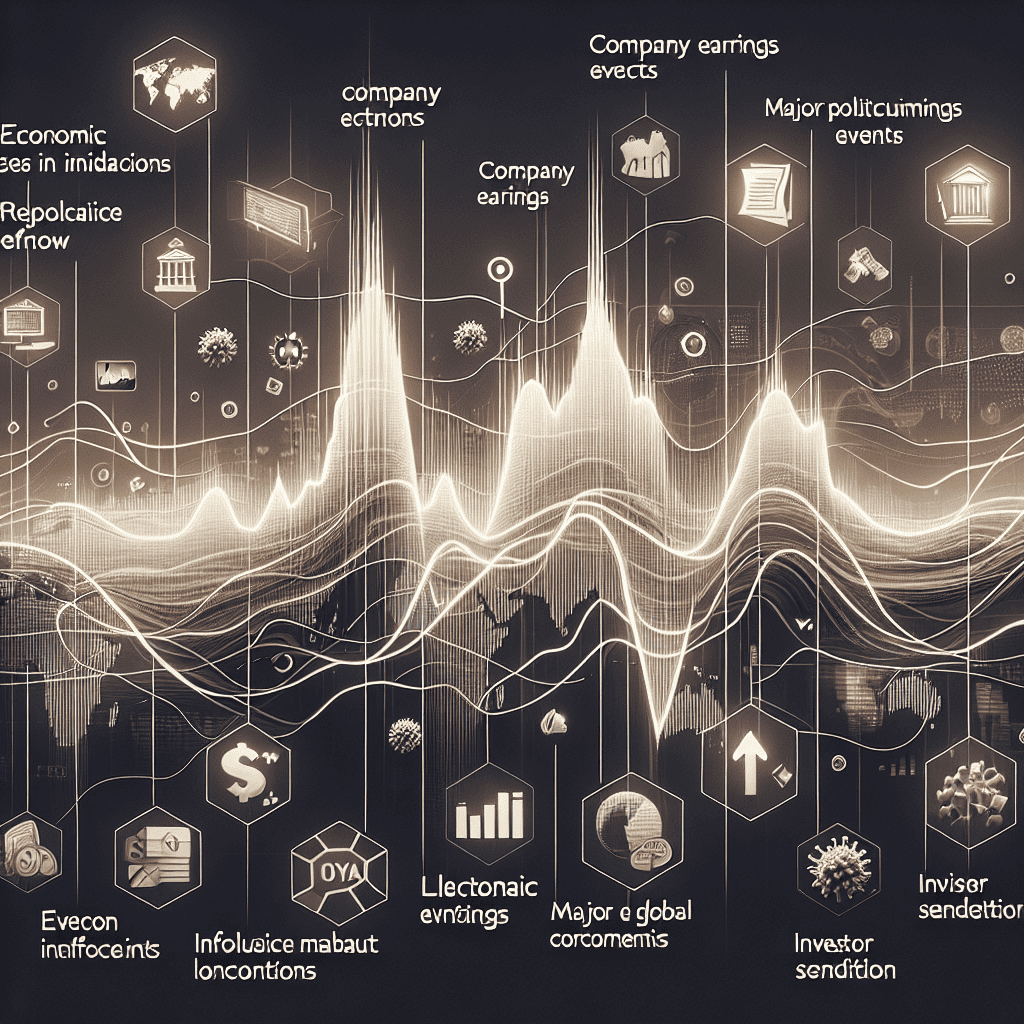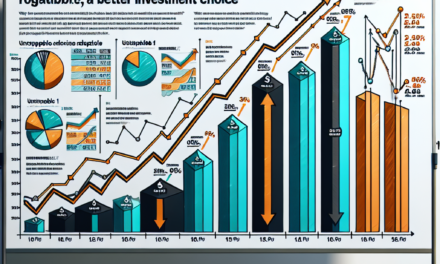“Unveiling the Hidden Forces: Beyond Ballots, the True Drivers of Market Dynamics”
Introduction
The stock market is a complex and dynamic entity influenced by a myriad of factors beyond just election outcomes. While political events can create short-term volatility, the long-term performance of the stock market is shaped by a broader set of influences. Economic indicators such as interest rates, inflation, and employment figures play a crucial role in determining market trends. Corporate earnings and financial health are also pivotal, as they reflect the underlying strength of businesses that constitute the market. Additionally, global events, technological advancements, and investor sentiment significantly impact market dynamics. Understanding these multifaceted influences provides a more comprehensive view of what truly drives the stock market, offering insights that extend beyond the immediate effects of political cycles.
Global Economic Indicators
The stock market is often perceived as a barometer of economic health, reflecting the collective sentiment of investors regarding the future of the economy. While election outcomes are frequently highlighted as significant influencers of market trends, a broader perspective reveals that global economic indicators play a more substantial role in shaping market dynamics. Understanding these indicators provides a more comprehensive view of the forces at play in the financial markets.
To begin with, interest rates set by central banks are a critical factor influencing stock market performance. Central banks, such as the Federal Reserve in the United States or the European Central Bank, adjust interest rates to control inflation and stabilize the economy. When interest rates are low, borrowing costs decrease, encouraging businesses to invest and expand, which can lead to higher corporate earnings and, consequently, rising stock prices. Conversely, when interest rates rise, borrowing becomes more expensive, potentially slowing economic growth and exerting downward pressure on stock prices. Thus, investors closely monitor central bank policies and interest rate announcements as they assess the potential impact on the market.
In addition to interest rates, inflation rates are another vital economic indicator. Inflation reflects the rate at which the general level of prices for goods and services is rising, eroding purchasing power. Moderate inflation is typically seen as a sign of a growing economy, but when inflation rates accelerate beyond a certain threshold, it can lead to uncertainty and volatility in the stock market. High inflation can squeeze profit margins for companies, as costs increase faster than revenues, leading to lower stock valuations. Therefore, investors pay attention to inflation data to gauge the potential impact on corporate profitability and market sentiment.
Moreover, gross domestic product (GDP) growth rates are a fundamental measure of economic performance that significantly influences stock markets. GDP represents the total value of goods and services produced within a country and serves as an indicator of economic health. Strong GDP growth signals a robust economy, often leading to increased consumer spending and business investment, which can drive stock prices higher. On the other hand, sluggish GDP growth or contraction can signal economic distress, prompting investors to reassess their portfolios and potentially leading to market declines.
Furthermore, employment data, including unemployment rates and job creation figures, provide insights into the labor market’s health and its implications for economic growth. A strong labor market, characterized by low unemployment and robust job creation, suggests increased consumer spending power, which can boost corporate revenues and stock prices. Conversely, rising unemployment can dampen consumer confidence and spending, negatively affecting market performance. Consequently, employment reports are closely scrutinized by investors seeking to understand the broader economic landscape.
In addition to these domestic indicators, global economic conditions also play a crucial role in influencing stock markets. International trade dynamics, geopolitical tensions, and economic performance in major economies such as China and the European Union can have far-reaching effects on global markets. For instance, trade disputes or geopolitical conflicts can disrupt supply chains and create uncertainty, leading to market volatility. Similarly, economic slowdowns in major economies can have a ripple effect, impacting global demand and investor sentiment.
In conclusion, while election outcomes can certainly impact stock markets, it is the broader array of global economic indicators that truly shape market trends. Interest rates, inflation, GDP growth, employment data, and international economic conditions collectively provide a more nuanced understanding of the forces driving market movements. By considering these indicators, investors can make more informed decisions and better navigate the complexities of the financial markets.
Interest Rate Changes
The stock market is a complex ecosystem influenced by a myriad of factors, and while election outcomes often capture the public’s attention, interest rate changes wield a profound impact on market dynamics. Understanding the relationship between interest rates and the stock market is crucial for investors seeking to navigate the financial landscape effectively. Interest rates, set by central banks, serve as a fundamental tool for regulating economic activity. When central banks, such as the Federal Reserve in the United States, adjust interest rates, they send ripples through the financial markets, affecting everything from consumer spending to corporate investment.
To begin with, interest rates directly influence the cost of borrowing. When rates are low, borrowing becomes cheaper for both consumers and businesses. This typically leads to increased spending and investment, as individuals are more inclined to take out loans for big-ticket items like homes and cars, while companies are more likely to invest in expansion and innovation. Consequently, this surge in economic activity can boost corporate earnings, which often translates into higher stock prices. Conversely, when interest rates rise, borrowing costs increase, potentially dampening consumer spending and business investment. This can lead to slower economic growth and, in turn, exert downward pressure on stock prices.
Moreover, interest rates affect the stock market through their impact on investor behavior. Low interest rates tend to make fixed-income investments, such as bonds, less attractive due to their lower yields. As a result, investors may shift their focus towards equities, seeking higher returns in the stock market. This increased demand for stocks can drive prices upward. On the other hand, when interest rates rise, bonds and other fixed-income securities become more appealing, offering better returns with relatively lower risk. This can lead to a reallocation of investment portfolios, with some investors moving away from stocks and into bonds, potentially causing stock prices to decline.
In addition to influencing borrowing costs and investor preferences, interest rate changes also affect corporate profitability. Many companies rely on borrowed funds to finance their operations and growth initiatives. When interest rates are low, the cost of servicing debt is reduced, allowing companies to allocate more resources towards productive activities. This can enhance profitability and, by extension, support higher stock valuations. However, when interest rates increase, the cost of debt rises, potentially squeezing profit margins and leading to lower stock prices.
Furthermore, interest rate changes can have a psychological impact on market participants. Central banks often adjust interest rates in response to economic conditions, such as inflation or unemployment. When rates are lowered, it may signal that the central bank is concerned about economic growth, prompting investors to adopt a more cautious outlook. Conversely, rate hikes may indicate confidence in the economy’s strength, encouraging a more optimistic market sentiment. These psychological factors can influence investor behavior and contribute to market volatility.
In conclusion, while election outcomes undoubtedly play a role in shaping the stock market, interest rate changes exert a more direct and immediate influence. By affecting borrowing costs, investor preferences, corporate profitability, and market sentiment, interest rates serve as a critical determinant of stock market performance. Investors who understand the nuances of interest rate dynamics are better equipped to make informed decisions and navigate the ever-changing financial landscape. As such, keeping a close eye on central bank policies and interest rate trends is essential for anyone seeking to understand and anticipate stock market movements.
Corporate Earnings Reports
The stock market is often perceived as a barometer of economic sentiment, reacting to a myriad of factors that influence investor confidence and decision-making. While election outcomes are frequently highlighted as significant events that sway market trends, it is crucial to recognize that corporate earnings reports play a more substantial and consistent role in shaping market dynamics. These reports, which provide a detailed account of a company’s financial performance over a specific period, offer investors critical insights into the health and future prospects of a business. Consequently, they serve as a fundamental driver of stock prices and market movements.
To begin with, corporate earnings reports are pivotal because they offer a transparent view of a company’s profitability, revenue growth, and operational efficiency. Investors scrutinize these reports to assess whether a company is meeting, exceeding, or falling short of market expectations. When a company reports earnings that surpass analysts’ forecasts, it often leads to a surge in its stock price, as investors anticipate continued growth and profitability. Conversely, disappointing earnings can trigger a decline in stock value, as they may signal underlying issues or challenges that could hinder future performance.
Moreover, earnings reports provide valuable information about a company’s strategic direction and management effectiveness. They include forward-looking statements and guidance that help investors gauge the company’s future trajectory. For instance, a company that consistently raises its earnings guidance is likely to instill confidence among investors, suggesting that it is well-positioned to capitalize on market opportunities. On the other hand, a downward revision in earnings guidance can raise red flags, prompting investors to reevaluate their positions and potentially leading to a sell-off.
In addition to individual company performance, earnings reports collectively offer insights into broader economic trends and sector-specific developments. By analyzing earnings across various industries, investors can identify patterns and shifts in consumer behavior, technological advancements, and regulatory impacts. For example, robust earnings in the technology sector may indicate increased demand for digital solutions, while weak performance in the retail sector could reflect changing consumer preferences or economic headwinds. These insights enable investors to make informed decisions about asset allocation and portfolio diversification.
Furthermore, the timing of earnings reports can amplify their impact on the stock market. Earnings season, which occurs quarterly, is a period of heightened volatility as companies release their financial results in rapid succession. During this time, market participants closely monitor earnings announcements, leading to swift and sometimes dramatic price movements. This heightened activity underscores the importance of earnings reports as a catalyst for market fluctuations, often overshadowing other factors such as political events or macroeconomic indicators.
In conclusion, while election outcomes undoubtedly influence investor sentiment and market trends, corporate earnings reports hold a more enduring and direct impact on the stock market. They provide a comprehensive assessment of a company’s financial health, strategic direction, and future prospects, serving as a critical tool for investors seeking to navigate the complexities of the market. By offering insights into both individual company performance and broader economic trends, earnings reports enable investors to make informed decisions that ultimately shape market dynamics. As such, understanding the nuances of corporate earnings is essential for anyone looking to comprehend the forces that truly drive the stock market beyond the realm of political events.
Geopolitical Events

The stock market is a complex entity influenced by a myriad of factors, and while election outcomes often capture the public’s attention, geopolitical events play a significant role in shaping market dynamics. Understanding the influence of these events requires a nuanced appreciation of how global political developments can impact investor sentiment, economic stability, and ultimately, market performance.
To begin with, geopolitical events can create uncertainty, which is a key driver of market volatility. Investors generally prefer stability and predictability, and when geopolitical tensions arise, such as conflicts, trade disputes, or diplomatic standoffs, the resulting uncertainty can lead to market fluctuations. For instance, the escalation of trade tensions between major economies can disrupt global supply chains, leading to increased costs for businesses and affecting their profitability. This, in turn, can cause stock prices to fluctuate as investors reassess the potential risks and rewards associated with their investments.
Moreover, geopolitical events can directly impact specific sectors or industries, further influencing the stock market. For example, tensions in oil-producing regions can lead to fluctuations in oil prices, which can have a ripple effect across various sectors. Higher oil prices can increase operational costs for transportation and manufacturing industries, potentially reducing their profit margins and affecting their stock valuations. Conversely, companies involved in energy production may see their stock prices rise due to increased demand for their products. Thus, the interconnectedness of global markets means that geopolitical events can have far-reaching consequences beyond their immediate geographical boundaries.
In addition to sector-specific impacts, geopolitical events can also influence investor confidence and risk appetite. When geopolitical tensions escalate, investors may become more risk-averse, opting to move their capital into safer assets such as government bonds or gold. This shift in investment strategy can lead to a decrease in demand for equities, resulting in lower stock prices. Conversely, when geopolitical tensions ease, investor confidence may be restored, leading to increased demand for stocks and a potential market rally.
Furthermore, central banks and governments often respond to geopolitical events with policy measures that can influence the stock market. For instance, in response to economic disruptions caused by geopolitical tensions, central banks may adjust interest rates or implement monetary stimulus measures to support economic growth. These policy actions can have a direct impact on the stock market by influencing borrowing costs, consumer spending, and business investment. Similarly, government fiscal policies, such as changes in taxation or public spending, can also affect market dynamics by altering the economic landscape in which businesses operate.
It is also important to consider the role of technology and information dissemination in amplifying the impact of geopolitical events on the stock market. In today’s digital age, news of geopolitical developments can spread rapidly across the globe, influencing investor sentiment in real-time. Social media platforms and financial news outlets provide investors with immediate access to information, allowing them to react quickly to geopolitical events. This rapid dissemination of information can exacerbate market volatility, as investors adjust their positions based on the latest developments.
In conclusion, while election outcomes are often highlighted as key influencers of the stock market, geopolitical events play an equally, if not more, significant role in shaping market dynamics. By creating uncertainty, impacting specific sectors, influencing investor confidence, and prompting policy responses, geopolitical events can have profound effects on the stock market. Understanding these influences is crucial for investors seeking to navigate the complexities of global financial markets.
Technological Advancements
The stock market is often perceived as a barometer of economic health, with its fluctuations closely monitored by investors, policymakers, and the general public alike. While election outcomes are frequently cited as significant influencers of market trends, it is crucial to recognize that technological advancements play an equally, if not more, pivotal role in shaping the stock market’s trajectory. As we delve into the intricate relationship between technology and market dynamics, it becomes evident that innovations in technology have far-reaching implications that extend beyond the immediate aftermath of political events.
To begin with, technological advancements have revolutionized the way trading is conducted, leading to increased efficiency and accessibility. The advent of electronic trading platforms has democratized access to the stock market, allowing individual investors to participate alongside institutional players. This shift has been facilitated by high-frequency trading algorithms, which execute trades at lightning speed, thereby enhancing liquidity and reducing transaction costs. Consequently, the market has become more responsive to real-time data, with prices adjusting rapidly to new information. This heightened efficiency underscores the profound impact of technology on market operations, transcending the influence of political developments.
Moreover, the proliferation of big data and artificial intelligence has transformed the landscape of market analysis and decision-making. Investors now have access to an unprecedented volume of data, enabling them to make more informed decisions. Machine learning algorithms can analyze complex datasets to identify patterns and predict market trends with remarkable accuracy. This capability allows investors to anticipate market movements and adjust their strategies accordingly, thereby mitigating risks and maximizing returns. As a result, the stock market is increasingly driven by data-driven insights rather than speculative reactions to political events.
In addition to enhancing trading and analysis, technological advancements have also spurred innovation in financial products and services. The rise of fintech companies has introduced a plethora of new investment opportunities, such as robo-advisors and blockchain-based assets. These innovations have expanded the range of options available to investors, allowing them to diversify their portfolios and explore alternative asset classes. The growing popularity of cryptocurrencies, for instance, has introduced a new dimension to the market, challenging traditional notions of value and investment. This diversification of investment avenues underscores the transformative impact of technology on the stock market, which extends beyond the influence of electoral outcomes.
Furthermore, technological advancements have facilitated global connectivity, enabling markets to operate on a truly international scale. The integration of global markets has been accelerated by advancements in communication technology, allowing for seamless cross-border transactions and information exchange. This interconnectedness has made the stock market more susceptible to global events and trends, diminishing the relative impact of domestic political developments. As a result, investors must now consider a broader array of factors, including technological innovations, when assessing market conditions.
In conclusion, while election outcomes undoubtedly have an impact on the stock market, it is essential to recognize the profound influence of technological advancements in shaping market dynamics. From revolutionizing trading practices to enhancing data analysis and expanding investment opportunities, technology has fundamentally transformed the stock market landscape. As we continue to witness rapid technological progress, its role in influencing market trends is likely to grow even more significant, underscoring the need for investors to remain attuned to technological developments alongside political events.
Market Sentiment and Investor Behavior
The stock market is a complex ecosystem influenced by a myriad of factors, and while election outcomes often capture the public’s attention, they are far from the sole determinants of market behavior. Beyond the political arena, market sentiment and investor behavior play pivotal roles in shaping the trajectory of stock prices. Understanding these elements requires a deep dive into the psychological and economic forces at play.
Market sentiment, often described as the overall attitude of investors toward a particular market or asset, is a powerful driver of stock prices. It is shaped by a combination of factors, including economic indicators, corporate earnings reports, geopolitical events, and even natural disasters. For instance, positive economic data such as rising employment rates or increased consumer spending can boost investor confidence, leading to a bullish market sentiment. Conversely, negative news, such as a downturn in manufacturing output or escalating international tensions, can trigger fear and uncertainty, resulting in a bearish outlook.
Investor behavior, closely linked to market sentiment, is another critical factor influencing stock market dynamics. Behavioral finance, a field that combines psychological theories with conventional economics, provides insights into how investors make decisions. It highlights that investors are not always rational actors; instead, they are often swayed by emotions and cognitive biases. For example, the fear of missing out (FOMO) can drive investors to buy stocks at inflated prices during a market rally, while panic selling can occur during downturns as investors rush to cut their losses.
Moreover, herd behavior, where investors follow the actions of the majority, can amplify market trends. This phenomenon is particularly evident during periods of market volatility, where the actions of a few can quickly snowball into widespread buying or selling. Such behavior can lead to asset bubbles or market crashes, as seen in historical events like the dot-com bubble of the late 1990s or the housing market crash of 2008.
In addition to psychological factors, technological advancements have also transformed investor behavior and market sentiment. The rise of algorithmic trading and high-frequency trading has increased market efficiency but also introduced new challenges. These technologies can exacerbate market movements by executing large volumes of trades in milliseconds, often based on pre-set algorithms that react to market data. While this can lead to increased liquidity, it can also result in sudden and significant price swings, contributing to market volatility.
Furthermore, the proliferation of social media and online trading platforms has democratized access to market information, allowing retail investors to participate more actively in the stock market. This shift has given rise to new dynamics, as seen in the recent phenomenon of meme stocks, where coordinated buying by retail investors on platforms like Reddit has led to dramatic price surges in certain stocks. This underscores the growing influence of collective investor sentiment in the digital age.
In conclusion, while election outcomes can impact the stock market, they are just one piece of a larger puzzle. Market sentiment and investor behavior, driven by a complex interplay of psychological, economic, and technological factors, are crucial in understanding stock market movements. By recognizing these influences, investors can better navigate the uncertainties of the market and make more informed decisions. As the financial landscape continues to evolve, staying attuned to these elements will be essential for anyone looking to understand or participate in the stock market.
Natural Disasters and Environmental Factors
The stock market is a complex system influenced by a myriad of factors, and while political events such as elections often capture the public’s attention, natural disasters and environmental factors also play a significant role in shaping market dynamics. Understanding these influences requires a comprehensive examination of how environmental events impact investor behavior, corporate performance, and economic stability.
Natural disasters, such as hurricanes, earthquakes, and wildfires, can have immediate and profound effects on the stock market. These events often lead to significant disruptions in supply chains, damage to infrastructure, and loss of human capital, all of which can negatively impact the financial performance of affected companies. For instance, a hurricane that devastates a coastal region may lead to substantial losses for insurance companies, construction firms, and local businesses. Consequently, investors may react by selling off stocks in these sectors, leading to a decline in market indices. Moreover, the uncertainty surrounding the extent of the damage and the time required for recovery can exacerbate market volatility, as investors grapple with the potential long-term economic implications.
Beyond the immediate aftermath of natural disasters, environmental factors such as climate change pose a more persistent and systemic risk to the stock market. As climate change leads to more frequent and severe weather events, companies across various industries face increased operational risks and costs. For example, agricultural firms may experience reduced crop yields due to changing weather patterns, while energy companies might encounter regulatory pressures to reduce carbon emissions. These challenges can affect corporate earnings and, by extension, stock valuations. Investors are increasingly aware of these risks and are beginning to incorporate environmental considerations into their investment decisions, leading to a growing emphasis on sustainable and socially responsible investing.
In addition to direct impacts on specific industries, environmental factors can also influence broader economic conditions, which in turn affect the stock market. For instance, a severe drought can lead to higher food prices, contributing to inflationary pressures that may prompt central banks to adjust interest rates. Such monetary policy changes can have far-reaching effects on the stock market, as they influence borrowing costs, consumer spending, and business investment. Furthermore, environmental degradation can undermine economic growth by depleting natural resources and reducing biodiversity, which are essential for long-term economic sustainability.
While the direct and indirect impacts of natural disasters and environmental factors on the stock market are evident, it is important to recognize that these influences are often intertwined with other economic and geopolitical factors. For example, a natural disaster in a major oil-producing region can lead to supply disruptions that drive up global oil prices, affecting not only energy stocks but also industries reliant on oil, such as transportation and manufacturing. Similarly, environmental policies aimed at mitigating climate change can create both challenges and opportunities for businesses, depending on their ability to adapt to new regulations and technologies.
In conclusion, while election outcomes are often highlighted as key drivers of stock market performance, natural disasters and environmental factors are equally important in shaping market dynamics. These events and conditions can have immediate and long-term effects on investor behavior, corporate performance, and economic stability. As the frequency and severity of environmental challenges continue to rise, it is crucial for investors, companies, and policymakers to consider these factors in their decision-making processes to ensure a resilient and sustainable financial system.
Q&A
1. **Economic Indicators**: Factors such as GDP growth, unemployment rates, inflation, and consumer spending can significantly influence stock market performance as they reflect the overall health of the economy.
2. **Interest Rates**: Central bank policies and interest rate changes can impact borrowing costs and investment returns, influencing investor behavior and stock prices.
3. **Corporate Earnings**: Company performance, as reflected in quarterly earnings reports, can drive stock prices up or down based on whether results meet, exceed, or fall short of market expectations.
4. **Global Events**: Geopolitical tensions, natural disasters, and international trade agreements can create uncertainty or opportunities, affecting investor sentiment and market volatility.
5. **Market Sentiment**: Investor psychology, including fear and greed, can lead to market trends and movements that are not always aligned with fundamental analysis.
6. **Technological Advancements**: Innovations and disruptions in technology can create new market leaders and impact industries, influencing stock valuations and investor interest.
7. **Regulatory Changes**: New laws, regulations, or changes in government policy can affect industries and companies, impacting their profitability and stock performance.
Conclusion
The stock market is influenced by a multitude of factors beyond election outcomes, including economic indicators, corporate earnings, interest rates, geopolitical events, and investor sentiment. Economic indicators such as GDP growth, unemployment rates, and inflation provide insights into the health of the economy, affecting market performance. Corporate earnings reports offer a direct measure of company performance, influencing stock prices. Interest rates, set by central banks, impact borrowing costs and investment decisions, thereby affecting market dynamics. Geopolitical events, such as trade tensions or conflicts, can create uncertainty and volatility in the markets. Lastly, investor sentiment, driven by psychological factors and market trends, can lead to fluctuations in stock prices. While elections can create short-term market movements due to policy expectations, these broader factors play a more significant and sustained role in shaping market trends.





